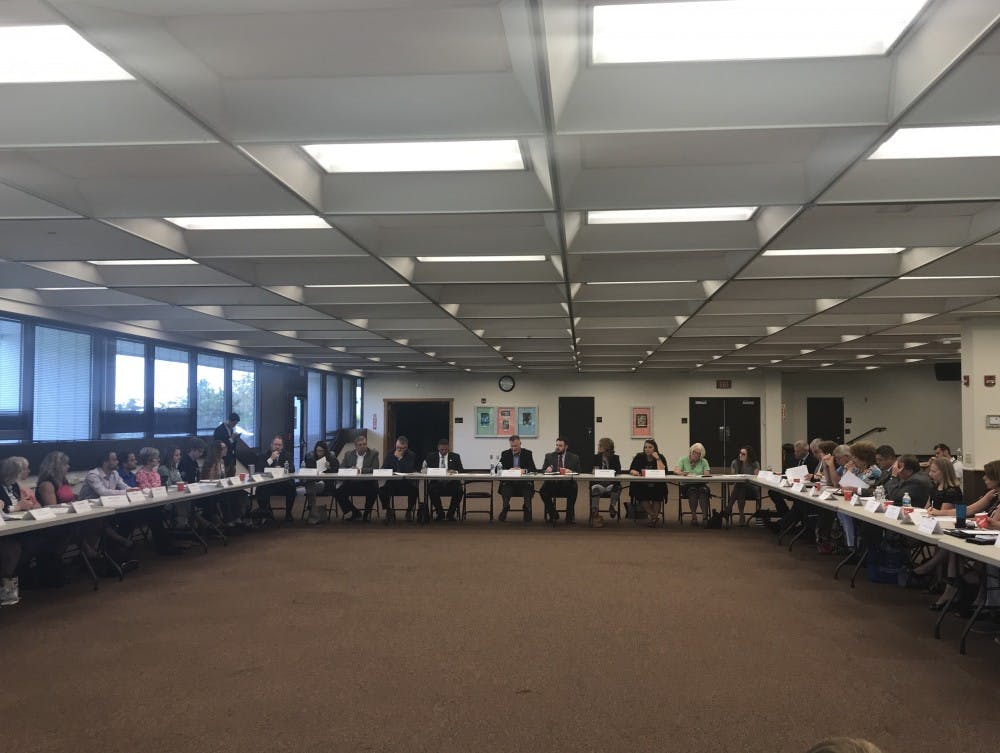LANCASTER— Around 50 community members including university officials, health care providers, social workers, law enforcement officers and judges gathered with Representative Steve Stivers, R-Upper Arlington on Wednesday to discuss the opioid epidemic.
The roundtable focused on local impact, treatment and rehabilitation, housing, employment and prevention initiatives. Stivers said the main takeaways from this year’s roundtable included the need for increased funding for law enforcement and rehabilitation services, the need for comprehensive prevention initiatives and recognizing pain as a vital sign that leads to increased opiate use.
“This was really great to see 360 degrees,” Stivers said.
Over the course of the discussion, Stivers compiled a list of 17 “really helpful” legislative recommendations, he said.
During the local crime and community impacts section of the roundtable, local law enforcement officers reported that the dark web is a rising factor in drug-related offenses.
“Law enforcement as a whole is very under trained and under informed on dark web issues … locally we need to increase of capabilities regarding the dark web,” Fairfield-Hocking-Athens Major Crimes Unit Commander Dennis Lowe said.
Although supply was a factor in Wednesday’s discussion, treatment and rehabilitation were recurring themes.
(The Major Crimes Unit) is really focusing on supply side contenders and really trying to connect those low-level offenders with treatment options and recovery options,” Lowe said.
Other prevention efforts included in the discussion revolved around education in schools at an early age, early warning systems in schools, social supports such as mental health care and addressing the culture around prescription drugs.
The topic of pain as a vital sign, meaning that pain is one of the measures a physician takes when assessing a person’s health, was the focus with regard to “pill popping culture,” Hocking County Municipal Court Judge Fred Moses said.
"We are the only first world country where pain is a vital sign,” he said. “At some point we’re going to have to … stop incentiving drugs for money.”
Rhonda Myers, executive director with Fairfield County Alcohol, Drug Addiction and Mental Health Board, opened the portion of the roundtable about prevention initiatives. She focused on the success and challenges of such efforts, including their underfunding by the government.
“The community is very interested in (scientifically studied programs) and professionals believe there is benefit to folks with providing prevention programming,” Myers said.
Funding allocations for sober housing and recovery programming also brought up discussion around government funds.
“On the federal level ... those dollars that come into Ohio for rehab, we end up having to send a lot of money back to federal government because we’re not using all the money,” Lori Criss, the CEO of The Ohio Council of Behavioral Health and Family Services Providers, said. “The design is not meeting the needs.”
Stivers has hosted the Opiate and Addiction Roundtable for six years and each year, the conversations have resulted in legislation.
After last year’s roundtable, Stivers introduced the Substance Use-Disorder Prevention that Promotes Opioid Recovery and Treatment (SUPPORT) for Patients and Communities Act, which was bipartisan legislation that passed the House of Representatives in June.






